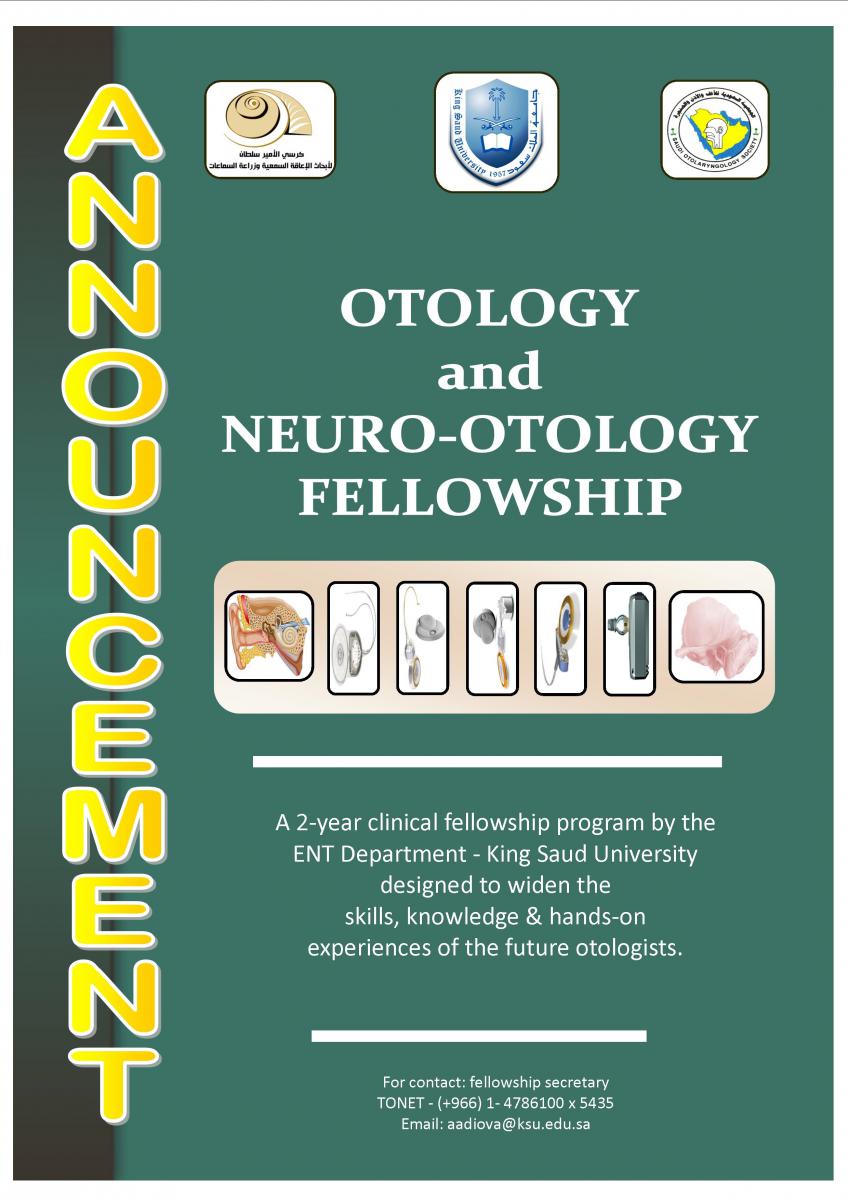Otology & Neurotology
INTRODUCTION:
The vast majority of the prominent graduates of King Saud University (KSU) fellowship training program have molded their own distinct identity in their chosen fields particularly in the specialty of Otorhinolaryngology, head and Neck Surgery (ORL. H and N surgery). These graduate have gone a long way and have proven their worth.
Most of them are currently contributing with their respective shares in extending training to the would-be fellows, as well as holding prestigious positions in different hospitals within and/or outside the kingdom.
GENERAL OBJECTIVES:
Otologist and neurotologist must possess a sound knowledge in the general principles of medicine and surgery.
During the course of training, the fellow will acquire satisfactory knowledge of the principles common to all ear surgical practice.
Otology and neurotology, embraces some components of neurotology, neurosurgery, plastic surgery, dermatology, pathology and other specialties. The candidate must have sufficient knowledge in these fields as it relates to the specialty.
During the course of training, the fellow must develop clinical competence and detailed knowledge of the scientific rationale for the medical and surgical management of ear disorders in patients of all ages. This includes knowledge of the techniques of otology, neurotologic, neuro, and cosmetic surgeries and radiation. In addition, the fellow should be able to develop special expertise in the diagnosis and medical/surgical management of diseases and disorders related to disciplines within otology/neurotology such as: auditory system, vestibular system, facial nerves, temporal bones and related skull base structures, tumors and other lesions of the cerebellopontine angle and lateral skull base.
The fellow must demonstrate the knowledge, skills and attitudes relating to gender, culture, and ethnicity pertinent to otorhinolaryngology. In addition, they must demonstrate the ability to incorporate these matters in research methodology, date presentation and analysis.
STRUCTURE OF THE PROGRAM:
- Educational
- Academic half day
- Clinical meetings
- Group rounds
- Journal clubs
- Guest speakers
- Promotion Exams
- Clinical
- Research
- Elective period
The duration of the sub-specialty training program is 2 years.
ADMISSION CRITERIA:
To be admitted to Otology/Neurotology subspecialty program, candidate must:
- Be a graduate of an approved school of Medicine.
- Be a Board eligible/Board certified otolaryngologist.
- Provide a letter of release and sponsorship as a full-time fellow for whole durations of the training.
- Successfully complete the admission exam and/or the interview.
- Provide (2) reference letters from consultants with whom the candidate is currently working or recently worked with for a minimum period of six months.
- Upon successful completion of the educational program, the graduate physicians will be capable to function as a consultant otologist and neurotologist.
PROGRAM CERTIFICATION
The fellowship is an accredited program by the department of Otorhinolaryngology Head and Neck Surgery at College of Medicine, King Saud University.

